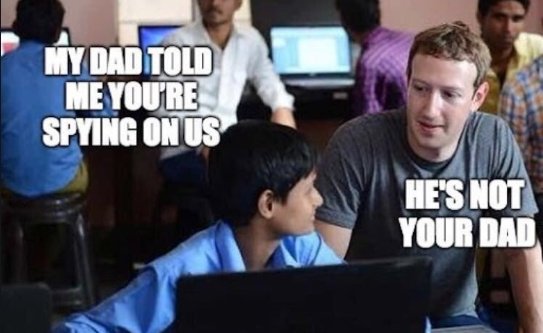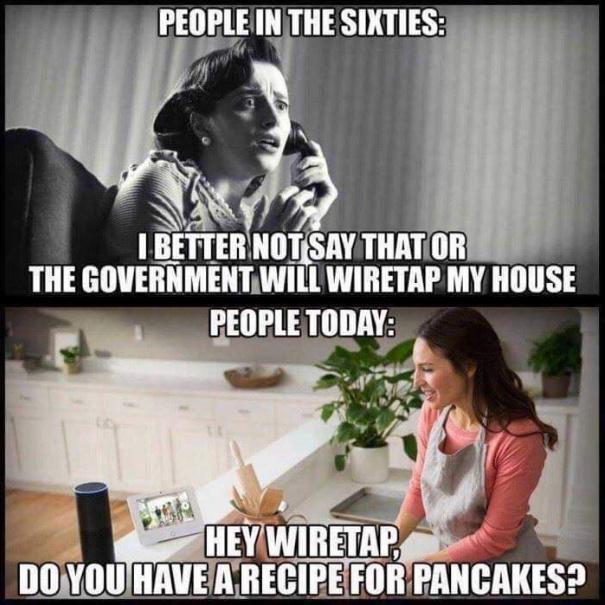Looks like I better keep my opinions to myself.
While it is concerning, I can see why it has taken this stance.
Maybe Australia shouid adoot a UK style approach, rather thsn a US one. The UK approach being the platform operator managing posts need to monitor and moderate, and to remove, in a reasonable time, non-compliant posts which have been subject of complaint.
The US system is opposite to that of Australia where a platform operator is not responsible for what is posted.
We know that if you bother to consider anything with a Trump sticker on Twitter.
Does the US law subsequently enable citizens of another nation EG Australia to post on a US media FB pages what ever and as derogatory a comment as Words might convey?
Hypothetically it could be there for prosperity?
Whilst on the subject of Facebook, SBS is screenibg a docunentary betwee 2:00 PM and 3:00PM this afternoon titled Facebookistan.
Facebookistan
2:00PM - 3:00PM
We voluntarily share information on our Facebook walls, and by signing their terms of service, we voluntarily allow Facebook to use this information for whatever the company finds useful. But we know very little about Facebook and how it uses our personal information for data. This documentary investigates the paradox of a social media that promotes openness and transparency, but which as a company reveals little of itself to the 1.4 billion people who use its services daily. It reveals how Facebook behaves within these parameters, meeting people who have crossed the invisible lines controlled by Facebook. It’s a journey into the unknown land of ‘Facebookistan’.
DOCUMENTARY | DENMARK | 2015 | M
No. While the US seeks to enforce its rules and standards globally on some things (Mickey Mouse, its exemption from prosecution for war crimes etc.), we still retain some areas in which we are permitted to self-govern.
If someone in Australia posts something to an online forum anything that is against Australian law they can be prosecuted here. That includes citizens of other countries who are in Australia for whatever purpose except under diplomatic cover.
Additionally, defamation laws exist in Australia and in the US. While it is more difficult to establish a case in the US, it is certainly possible to achieve, especially if backed by a Silicon Valley billionaire.
Australia does not have - and I suggest does not want - ‘freedom of speech’ as employed in the US. While the High Court has determined that our Constitution contains an implied freedom of speech, this is very narrowly defined and there are some clear exceptions including hate speech, inciting violence, or being a public employee who has views different to the current Powers That Be - although this case does not appear to have yet been settled. (Interestingly, the Commonwealth is represented on both sides of that argument.)
When first I saw this article, I thought it would be an interesting read regarding the topic of this thread.
But is was just another attempt by Murdoch & Co to try to look after their own vested interests.
I can’t see what they are bleating about as almost any item on Google News regarding an article from any of News’ Australian rags leads to a subscription page.
They should actually be thanking Google for providing more exposure for their subscription pages.
![]()
A couple of articles regarding Facebook and Google.
A $5 billion fine. Ouch.
Absolutely disgraceful.
![]()
We hear a lot about fines - it would be interesting to see how many of these fines ever get paid in full - even at a local level, ie ACCC etc …
As it was obvious in the case of Birubi Arts Pty Ltd where the ACCC did not pursue the director who is apparently back in business,no fines are paid and the grubs simply walk away laughing.
But in this case, despite a $5 billion penalty, the company, the shareholders and the financial markets apparently consider it as an early Xmas present.
It appears that Facebook will be happy to pay the penalty, perhaps out of their petty cash, and continue on as ususl.
Just try uploading images that contain the likeness of friends and see how many tagging suggestions you get … we are all ‘in there’, if we use Facebook.
Getting caught is one thing, stopping doing it is another …
Did you also say, We may also be in there if our friends use Facebook and have us (not on Facebook people) tagged too?
Just how far does the linking go? Does your friend who uses Facebook have you also listed in their Android Google mobile directory with your email, calendar reminders, birthdate, mobile number, etc etc?
The only device they ever use!
The only device Facebook needs you to use, but the more you use the greater the scrapings?
How far does each enterprise Facebook and Google reach into the other if you let them?
Indeed. It provably and demonstrably exists in the simple case I portrayed - but in the more complex and slightly less obvious cases you mentioned I would agree, while it might not splash evidence in your face that it has happened, I’d be surprised if there weren’t an order of magnitude more connections than the obvious. It’s more than a little interesting (or maybe scary).
I doubt the attributions, but there are so many of these, funny and …

From a 2017 article in “The Verge”
" Facebook is expanding how it uses facial recognition to find people in photos. From today, the company will notify users when someone uploads a photo with them in it — even if they’re not tagged. The user will then have the option to add their tag to the photo, leave themselves untagged, or report the photo if they think it’s inappropriate. The feature will also work with profile photos, but won’t be available in Canada or the EU, where data laws restrict the use of facial recognition.
According to Facebook, the new tool is designed to empower users by helping them control their image online. “We really thought this as a privacy feature for a long time. If someone posts a photo of you, you might not know about it,” Rob Sherman, Facebook’s head of privacy, told The Verge . “Now, the users can access the photo, and they can communicate to the person who posted it.”"
So back then they said they wouldn’t provide this in Canada or the EU because of Laws around Facial Recognition (FR) there, but if the photo was uploaded in say the US the same FR was going to be/is used to identify the person even if they reside in Canada or the EU. If a non Facebook person was tagged somewhere previously with their name etc on Facebook this FR would then identify that person and link them to any activity that the photo was referenced to. Who has access to all that, Facebook of course…
From the Facebook FR link above " Two years ago, we launched an automatic alt-text tool, which describes photos to people with vision loss. Now, with face recognition, people who use screen readers will know who appears in photos in their News Feed even if people aren’t tagged".
Hmm no need to be a FB user to be identified and be described about what you are doing or where you are. Yep privacy at it’s best.
So how do they notify people who refuse to use Facebook? The obvious solution would be to require proactive seeking of permission - not notification of Facebook users after their image has been uploaded while totally ignoring the rest of humanity!
It would be simpler to make FB compulsory, like voting, civic duty.
Great idea - they could run the economy as well ! central bank … oh, wait …
![]()
If you’re worried about Facebook storing your face data, here’s how to turn it off. The issue is it’s on by default, where it should be strictly opt in
That turns it off for the platform users, but what about for Facebook employees seeking out new ways of making money with your data?
To the best of my knowledge that is the ‘opt- out’ button but it’s unlikely they delete any data they’ve already collected (based on how they operate). When they introduced the feature they automatically scanned everyone’s photos and stored facial recognition data, so anyone already on Facebook has likely handed over all that data regardless.
Edit: I’ve had a detailed sift through their privacy information, and the only place I can find facial recognition mentioned at all is a lovely slideshow about how Facebook is my best friend and can check for my face in photos if I want. There isn’t a specific mention of facial recognition data in the list of data they collect, but any collected wont be deleted until 30 days after you delete your account, as per their standard use of your information.
So to sum up:
- Facial recognition data was collected from all existing Facebook users’ photos before they could decide if they wanted to allow it to be collected and read updated T&Cs
- Unclear if/how you can turn facial recognition off
- Unclear if facial recognition data is handled differently to any other data you provide
- Unclear if there’s any way to request that data be deleted without deleting your account
- Unclear if other people may hand over facial recognition data by posting photos of you
- Unclear if Facebook planning world domination


